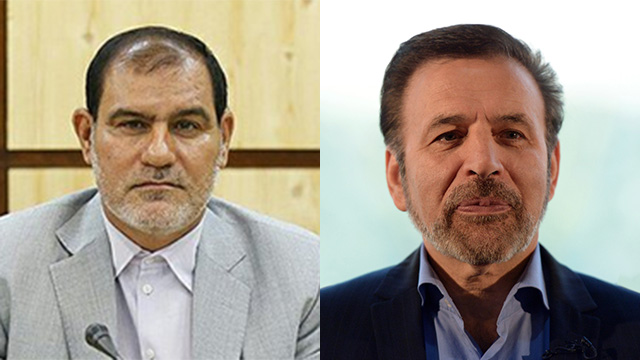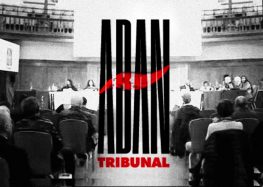Judicial Official Threatens Rouhani’s Telecommunications Minister With Criminal Charges Over Telegram

Photo caption: Telecommunications Minister Mahmoud Vaezi (right) and Deputy Prosecutor General Abdolsamad Khorramabadi
Iran’s Deputy Prosecutor General Abdolsamad Khorramabadi has threatened to take Telecommunications Minister Mahmoud Vaezi to court for his alleged refusal to block thousands of channels on Telegram, the country’s most widely used private messaging application.
“For reasons known to the telecommunications minister, we have so far been lenient in our response to the ministry’s failure in carrying out judicial orders,” said Khorramabadi on July 26, 2017. “From now on if the minister does not carry out the orders, we will definitely file criminal charges against him after receiving permission from the prosecutor general and senior judicial officials.”
Days earlier Khorramabadi, who is also the secretary of Iran’s main internet censorship body, the Taskforce to Determine Instances of Criminal Content (TDICC), accused the telecommunications ministry of refusing to block “a list of about 8,000 channels on the Telegram network with criminal content against the people’s sacred and national values.”
Vaezi, who was appointed to his post by President Hassan Rouhani, rejected the notion while cautioning the judiciary against ordering channels blocked solely for the channels’ political affiliation.
“He thinks everything should be blocked,” said Vaezi about Khorramabadi in a meeting with a group of conservative members of Iran’s Parliament on July 15. “But based on what Iran and the world has learned from experience, we believe that shutting down more sites will reduce opportunities and push people to use filter breakers.”
The digital tool enables users to access blocked or censored parts of websites.
“During the [May 2017] elections, they asked us to close down some of the social media channels that supported one [political] faction or another,” added Vaezi without indicating which authority made the demands. “What do they [the channels] have to do with criminal content?… We are in contact with officials at Telegram, but they refuse to shut down political channels.”
Khorramabadi Changes His Mind
Meanwhile Khorramabadi reversed his longtime position on Telegram hosting its servers in Iran.
Iranian officials have repeatedly tried to convince Telegram to move its servers onto Iranian soil in order to monitor, restrict and control domestic user activity, which they continue to attempt with the internet. Telegram claims it has denied all such requests, but is currently using technological infrastructure in Iran.
In May 2016 the prosecutor threatened to block access to Telegram unless the company agreed to move its servers into the country. However, on July 26 Khorramabadi said Telegram’s official presence in Iran would legitimize dependence on the foreign-owned social media network.
“Telegram’s entry into Iran with its servers would consolidate [foreign] infiltration and espionage in the country,” said the conservative prosecutor. “The impact of Telegram’s current unofficial and uncontrollable activities is even worse. Both scenarios mean dependency on foreigners in cyberspace.”
Khorramabadi’s recent comments coincide with Telegram’s installation of content delivery networks (CDN), caching servers that allow faster delivery of multimedia data, inside Iran.
Khorramabadi went on to criticize the fact that Iranians are allowed to access Telegram channels such as the popular and independent Amad News as well as channels belonging to the outlawed Mojahedin-e-Khalq (MEK) and the group that calls itself the Islamic State—both of which have committed terrorist attacks in Iran.
“Daesh [ISIS] coordinated everything through Telegram for its terrorist attack on our Parliament [on June 7, 2017],” he claimed. “It is not acceptable to any Iranian for ISIS to post a video on Telegram of its attack on Parliament without us taking technical action against it.”





